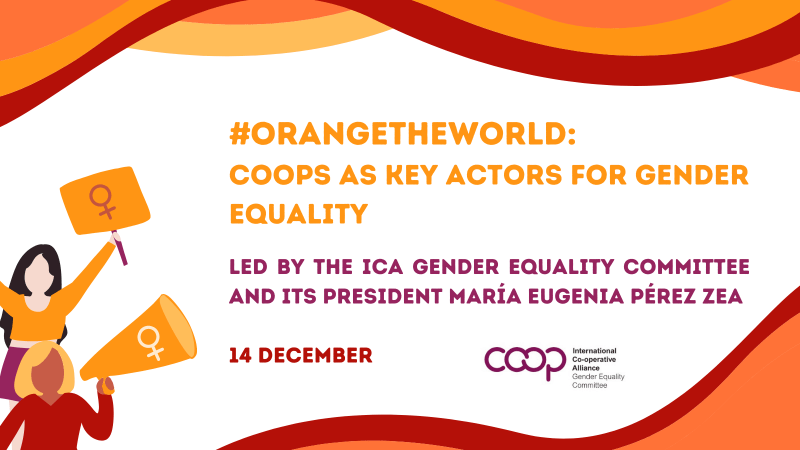#Orangetheworld: Cooperatives as key actors for gender equality

The ICA’s Gender Equality Committee (GEC) hosted a pre-recorded online event on 14 December to showcase how cooperatives across the world are helping to end gender-based violence. The event marked the end of the UN's 16 Days of Activism against Gender-Based Violence campaign which began 25 November under the tagline: "Orange the World: Fund, Respond, Prevent, Collect!", and in which the ICA took part.
The event featured pre-recorded video messages from cooperative leaders worldwide.
In her message, Maria Eugenia Pérez Zea, President of the ICA Gender Equality Committee, said the Covid-19 pandemic had led to more unemployment, increased the burden of household work and harmed / damaged the mental, physical and emotional health of some women. Domestic violence against women also increased during lockdown.

Ms Pérez Zea added: “I have hope when I think there are millions to fight for, that there are millions who need the commitment, effort and actions of those of us who have raised our voices, because it is everyone's task to end violence against women and girls.”
Professor Esther Gicheru, chair of the ICA Africa Gender Equality Committee, shared how cooperatives in Kenya had helped women affected by domestic violence by creating support centres. Credit cooperatives also offered loans to women who struggled to make ends meet due to lockdown restrictions, she added.
Nandini Nazad, chair of the ICA Asia-Pacific Women’s Committee , explained how cooperatives in India were raising awareness at local level by providing training in women’s rights.
Xiomara Núñez de Céspedes, Vice-Chair of the ICA Gender Equality Committee and chair of the regional committee for the Americas, also talked about the impact of the lockdown on women and children. “Tackling domestic violence adds to the long list of pending issues that authorities and states have to deal with in this state of emergency,” she said. “We must all immerse ourselves in a permanent campaign to generate change in sexist behaviours that endanger the integrity of women and girls.”
Stefania Marcone, Chair of Cooperatives Europe’s Gender Equality Working Group, said the best way to support the campaign was to pay tribute to victims of gender violence and showcase cooperatives’ best practice. “Together we can change the state of play for millions of women and girls,” she said.
Anna Manca, President of the Italian Alliance Women and Equality Commission, said gender violence prevented many women from realising their full potential. Her organisation works closely with Italian cooperatives to provide job placements to women victims of gender violence. Sharing information is crucial to tackling the issue, she said.
Annalisa Casino, co-President of the Italian Alliance Women and Equality Commission, added: “As a movement characterised by the value of cooperation we work together to build an inclusive and non-stereotypical culture convinced that this is the key to tackling gender based violence.”
ICA Director General Bruno Roelants highlighted some of the key initiatives undertaken by the ICA to promote gender equality – including embracing the ILO’s Convention No. 190, Recommendation No. 206 on Eliminating Violence and Harassment in the World of Work and approving a Declaration on positive peace at the ICA General Assembly in Kigali in 2019.
“At the same general assembly, the ICA approved a new strategic plan within which the fight against gender based violence also has its place,” he added.
Reema Nanavaty, Executive Director of the Self-Employed Women’s Association (SEWA) told how her organisation empowers 1.9m women workers through collective bargaining. During the COVID-19 pandemic SEWA provided secure jobs to women at risk, while member cooperatives started manufacturing masks and helped farmers sell their produce to areas in lockdown.
“When a woman has economic security, work and income security, she is able to live a life of dignity and self-respect, she is no longer vulnerable and/or a victim of violence,” she said.
“We need to be united,” added Ms Perez Zea, calling on men and women to work together to build a peaceful world.
“We need to show what cooperatives are doing because if we don’t show what we are doing it will be difficult to achieve change,” she concluded.
Watch the full event here:
